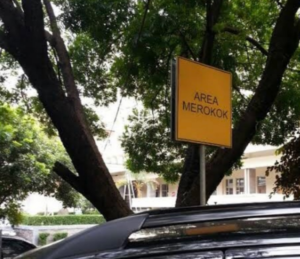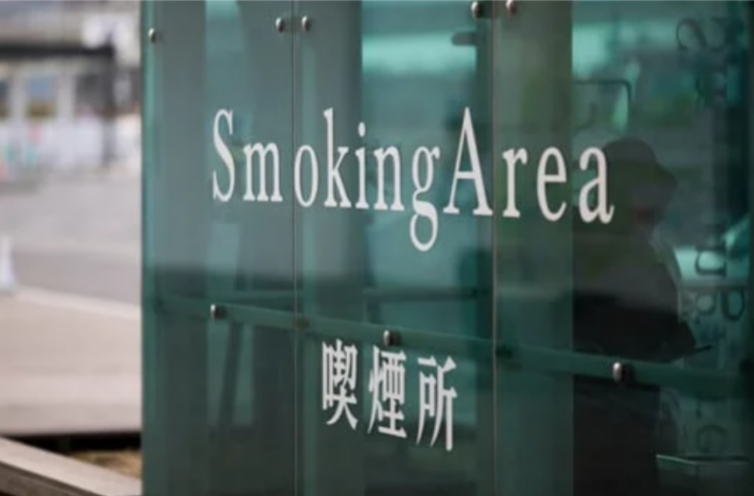Smoke Signals: Japan’s Strict Smoking Rules

Regulated Areas in Japan for Smoking (Source: Getty Images)
Smoking in Japanese public spaces is tightly regulated with designated smoking zones commonly seen in urban and university areas. According to Japanese International Indonesian Literature student Takumu Kubota, who is studying at Universitas Padjadjaran (Unpad), “In Japan, there aren’t too many smokers compared to Indonesia. Even so, we still have certain areas to smoke. Designated smoking spaces are much better for health, especially for children.” Japan’s approach restricts smoking to designated areas, reducing exposure to secondhand smoke for the general public. Kubota noted that the Japanese government supports these restrictions through various policies to control cigarette litter and promote health-conscious habits. Although, he comments on the fair amount of smokers in Indonesia and how little regulations there are in place.
Unpad’s Policy: A No-Zone Approach
Unpad’s campus currently lacks official smoking zones, leading smokers to improvise in informal areas. According to Alfetta Revaline, an Unpad student in the Faculty of Social and Political Sciences (FISIP), “I smoke wherever, but I (tend to) avoid classrooms. If someone doesn’t want to be around smoke, I just simply move away.” The absence of designated smoking areas causes smokers and non-smokers to often share the same spaces, causing discomfort for some students. Unpad’s non-smoker student, Ranya Najma Zayyana commented, “It affects my breathing when friends smoke nearby. I think campuses should create designated smoking areas to balance comfort for everyone.”
The smoking practices at Unpad contrast with designated areas in other Indonesian universities. It can also be seen in the broader culture in Japan. The lack of structured spaces at Unpad has left the campus environment less organized, with Revaline suggesting that, “Maybe smoking areas could help with organization, but following the rules might be hard for some.”
Smoking Spots in ITB: A Middle-Ground Approach

Smoking Area at Institut Teknologi Bandung Kampus Ganesha (Source: ppid.itb.ac.id)
Since its construction, Institut Teknologi Bandung (ITB) Kampus Jatinangor has established designated smoking areas on campus. ITB student Haryasty Rosa, from the Faculty of Art and Design (FSRD), shared, “Having a specific place makes it easier for others to smoke or vape on campus without disturbing others.” ITB’s smoking areas appear to create a more structured environment, with Rosa noting, “We have sanctions if we smoke outside those areas, which definitely affects smoking habits at ITB.”
According to non-smoking student, Melisa Aulia from ITB, the designated areas foster mutual respect between smokers and non-smokers: “Respect between both sides is key. I think it’s important that smokers understand etiquette, so even if there are many smoking areas, they use them responsibly.” By limiting smoking to specific zones, ITB accommodates smokers’ needs while creating a more comfortable campus atmosphere for non-smokers.
Japan vs Indonesia: Cultural Attitudes Toward Smoking
Japanese cultural attitudes tend to lean toward health consciousness and restricted smoking practices, influencing policies that prioritize public health. “Smoking is something that only certain people do in Japan,” Kubota observed. He contrasted it with Indonesia, “Many people smoke, and only a few areas restrict it.” Japan’s regulations are guided by strong societal values about public health, which are not as prevalent in Indonesia, where smoking is more integrated into daily life.
The lack of smoking restrictions in many Indonesian universities is in vibrant contrast to Japan, where campuses typically enforce structured policies to limit smoking in public spaces. In comparing the two, Takumu Kubota stated, “Japan’s smoking regulations are stricter, and their smoking areas are comfortable and clean.”
The Student Perspective: Voices from Both Sides of the Smoke
Students at both Unpad and ITB shared differing perspectives on the presence or absence of designated smoking areas on campus. ITB’s Rosa found the designated areas helpful. She stated, “It’s more organized with a specific space.” On the other hand, Revaline expressed skepticism about designated areas being effective at her university, where the social culture around smoking is well-established in informal spots. Non-smokers like Aulia and Zayyana emphasized the need for both sides to show mutual respect, highlighting that respectful smoking etiquette would improve campus comfort overall.
Clearing the Air
Students interviewed highlighted potential improvements, with many suggesting that Unpad could benefit from introducing designated smoking areas similar to ITB’s. Kubota proposed, “Just adding ashtrays and designated spots would help, it’s tough to stop smoking altogether. Maybe, students here can also adopt a habit of carrying pocket ashtrays as well,” Zayyana and Aulia agreed, adding that structured areas would reduce non-smokers’ exposure to smoke while keeping the campus environment cleaner.
Policy in the Making: Possible Construction for Smoking Areas
Unpad is considering a shift in its campus smoking policy with the establishment of designated smoking areas. The newly appointed Rector, Prof. Arief S. Kartasasmita, recently hinted at a policy that would create specific zones for smokers. He stated, “What I want to do first is to prepare the smoking areas.”
When asked whether these smoking zones would be available within the next 100 days, Prof. Arief emphasized the importance of realistic planning. He indicated that available funding would largely determine whether the smoking areas would be established across various faculties or centralized in one location. “It depends on the budget. I’ve said our budget is limited, so we will be realistic. Let’s open them in places where there are the most students,” he explained, signaling a priority for areas frequented by the most students.
Prof. Arief also underscored a fair approach, noting the importance of providing designated spaces before implementing stricter regulations. “If I say smoking is not allowed at Unpad but do not prepare a place for it, that would be unfair,” he remarked, indicating that simply banning smoking without providing appropriate areas would be unjust.
With ITB’s designated smoking areas setting a precedent in Jatinangor, this potential policy could mark a significant shift for Unpad, aiming to balance the needs of all students involved.
Penulis : Ravania Alya Putri
Editor : M. Aziz Fitratama, Shakila Azzahra M, Zulfa Salman A

